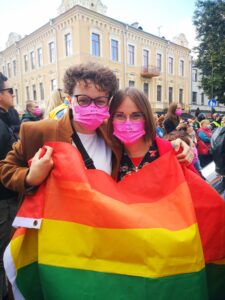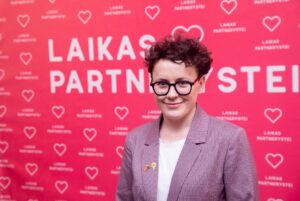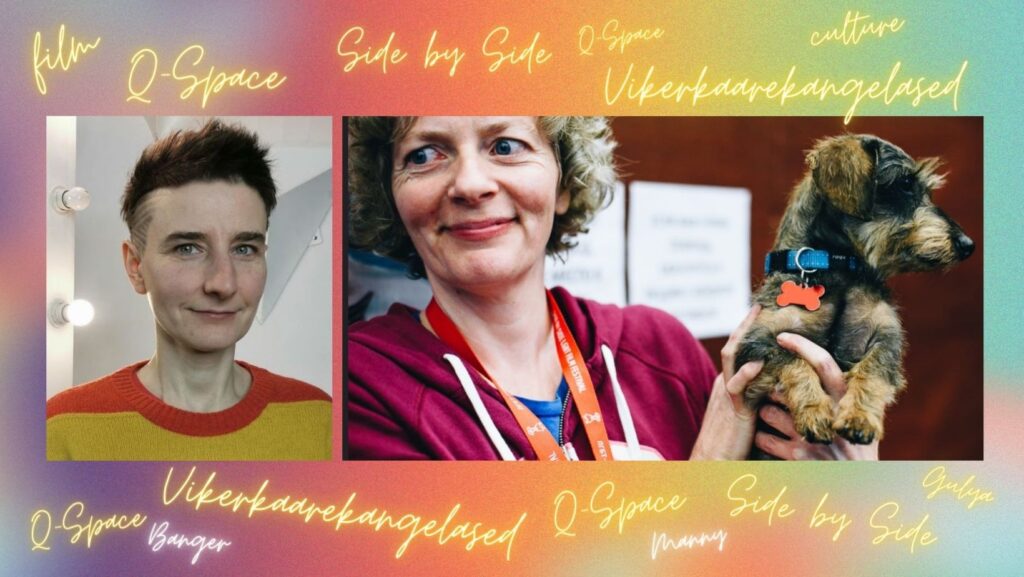“In Lithuania, people are just tired.” An interview with Birutė Sabatauskaitė and Jūratė Juškaitė
Baltic Pride was a joy, but it is fair to say that the three Baltic countries are at very different points in the field of LGBT+ rights. Estonia is even in a positive bubble, says Jūratė Juškaitė, the head of the Lithuanian Centre for Human Rights, who together with her partner, Birutė Sabatauskaitė, the Equal Opportunities Ombudsperson of Lithuania, talked to Feministeerium about the current state of their country in terms of queer issues.
The Estonian public is mostly unaware of what is happening in Lithuanian politics. What is the current situation regarding queer topics?
Jūratė: The political situation is very interesting. Two smaller coalition parties have promised to adopt a civil union law (something similar to the Estonian Registered Partnership Act – HR). These are smaller liberal parties, the governing coalition is led by the conservative party – Christian Democrats.
Many opposition parties try to use the political discussion space to mobilize people, saying: “We do not support such LGBT propaganda, we do not want the meaning of family to change.” However, the Constitutional Court in Lithuania has said several times that the constitutional concept of family is gender neutral and that marriage is one form of family, amongst others.
The current government was formed in 2020. More than half of their time in power has passed, but we are still struggling with the civil union bill. The final reading in parliament is to come, but we are not sure what the outcome will be.
Birutė: The LGBTQI issues are not written into the government’s long-term plans. Internationally, it may seem that Lithuania has taken a progressive direction, as some ministers have a positive attitude towards the queer community. In reality, the ministers have to constantly look for loopholes in the political agenda to make any progress on LGBTQI issues. We need laws to be passed and only the Parliament can do that. Which they don’t. So the progress is being seen in a slight increase in public support and self-organisation of LGBTQI community, but not in the political and legal spheres.
Does the Lithuanian public support the civil union bill?
Jūratė: Opinion polls are so and so. Of course, there are different ones, and the opposition has ordered some of them with very questionable wording. For example, “Do you agree that the parliament should adopt the civil union bill, even though there is currently a war going on in Ukraine?” They try to manipulate the responses and show that there is no public support. But if you look at more independent studies, you can say that somewhere around 40% of people support it.
How does religion influence this discussion?
Jūratė: The Lithuanian context is different from the Estonian one, as the influence of the Catholic Church on society is significant. It is constantly decreasing due to various scandals, for example, a few days ago another case of sexual abuse came to light. However, according to a recently published survey, 70% of people trust the church.
The Church has close ties to many politicians and other decision-makers when it comes to lobbying on specific issues. Also, religion has a lot of influence in rural areas. Unfortunately, the more inclusion orientated parts of the clergy are not that visible, nor are they as influential as the super conservative parts of the Catholic church.
I know of a case where the Catholic Church has told members of Parliament that if you vote in favor of the civil union bill, we will make sure you won’t be re-elected next time. According to the Constitution, the state and the church are separate. However, ultra conservative bishops and priests try to intervene in LGBT+ issues by influencing politicians and being vocal in the media.
Birutė: Freedom of religion should be respected, but in a secular state the church only has the right to make decisions within its own institution, not in relation to state-wide laws.

Jūratė Juškaitė and Birute Sabatauskaitė on the Kaunas Pride. Photo: private.
Are there laws in Lithuania that prohibit discrimination based on sexual orientation?
Birutė: Yes, in 2003, before joining the European Union, the Law on Equal Treatment was passed that prohibits discrimination in the workplace, in education and in goods and services, etc. Unfortunately, very few complaints of discrimination on the grounds of sexual orientation reach the Office of Equal Opportunities. People are too tired because they experience discrimination on a daily basis and they don’t see the point in complaining. They are waiting for a bigger change.
When discriminatory language is permissible at a higher political level, people may not trust the system or believe it will protect them. Lithuania has not respected the rights of trans people or protected the LGBT community from hate speech because of widespread discriminatory attitudes, according to several legal decisions from the European Court of Human Rights (ECHR).
At the beginning of this year, nine years after the court battle began, the ECHR ruled that the state of Lithuania had violated the principle of freedom of expression. Specifically, a book by children’s writer Neringa Macatė-Dangvydė – in which, among others, same-sex couples were depicted – was removed from the shelves. Does the ruling change something in the Lithuanian legislation, which still prohibits talking to minors about “detrimental topics”?
Birutė: Unfortunately not. Of course, with this decision, some kind of justice has finally been served for the author, who sadly died during the trial, fighting for her freedom of speech without discrimination. In fact, the book was not only about same-sex couples, but different social groups. It was nevertheless removed from the shelves and later on marked with the sign that the information might be detrimental to those under 14 years old.
The law against discussing “detrimental topics” is still in force, and although no one has been punished under it for a long time, it still plays an important role in maintaining self-censorship in schools. Teachers are not daring to talk to students about LGBTQI issues because they know such a law exists. Thus, almost no science-based information on this topic is shared in Lithuanian schools.
If we come back to the decision of the European Human Rights Court, it also stated that the law was created with the idea of limiting information about same-sex couples to children. In fact, it was worded exactly like that in its original draft, but fearing international outrage, those lines were removed and replaced the euphemistic “detrimental topics”.
I would say that in general there are not many openly queer people in the Baltic countries. How is the situation in Lithuania?
Birutė: There are some openly queer people, for example the new president of Latvia. This is a very big deal and I would say that more and more people from different walks of life are daring to come out in Lithuania, too.
Jūratė: But do you need more than ten fingers to count the famous queers of Lithuania?
Birutė: Yes, if you include the influencers. There are people in the defense forces, there are journalists. In many cases, unfortunately, there are just rumours, the persons have not come out themselves.
Jūratė: I still think ten fingers are enough. Now I’m going to say something I probably shouldn’t: I think some queers in high positions should also take responsibility. There are so many people who won’t come out and stand up for who they are, even though they have the power to do so. They are waiting for the younger generation to come and do these things and then somehow something will change. I understand that everyone’s situation is unique and it is very difficult, but the people in their 40s and 50s should take action and not leave everything to the young people.
What does the LGBT+ community need most right now?
Birutė: In Lithuania, people are not lesbian, gay or trans, they are just tired; tired of proving that they have not dropped down to earth from the moon, they just want to live their lives without having to come out of the closet and deal with the consequences every step of the way. For this, it is necessary to adopt laws that have been sitting in drawers for years.
But a safe environment is also needed. Currently, there is still a lot of fear about how this information can affect a person’s career, etc. I recently heard a story about a couple who came out back in 1995 and they said it still affects their lives when they try to apply for jobs. This information is available on Google and background checks are done before hiring. They would very much like it not to be publicly available information. Moreover, these are not even people known to the general public.
From my own experience when my candidacy was considered for the Equal Opportunities Ombudsperson, I felt that although we have laws against discrimination, the recruitment process was nothing but discriminatory. I was asked questions along the lines of “Did you get married in Denmark in 2015?” This question came from the gossip grapevine. I wanted to joke that maybe I did, but in that case I was not invited to my own wedding. However, the rest is not funny, only degrading.

Birutė Sabatauskaitė, Equal Opportunities Ombudsperson in Lithuania. Photo: Gabrielė Grėbliūnė
How is the Lithuanian trans community doing? How is gender transition regulated by law?
Birutė: An organization called Trans Autonomy was created a year ago. It’s a kind of a peer support group that simultaneously does a lot to make the trans community visible and makes sure that trans voices are heard, instead of having others speak on their behalf. I think this is a very important step forward.
Legally there has been very little progress. A rule in the Civil Code has a provision that should have ensured the right to “gender reassignment”. However no law has ever been passed. So in the last few years people have been fighting in courts for their rights.
An order was passed one and a half years ago and people can now change their name, but not their gender marker, through an administrative procedure. Even to change one’s name one must have a diagnosis; being transgender is still pathologized. In principle, this Minister’s order could be considered a progressive step, but in reality it is not. The courts still have a lot of work to do to “fix” the incomplete legislation, so that trans people can still change the gender marker on their documents.
There are new regulations on the provision of medical services to trans people, which means there is now free access to some procedures that weren’t available before. However it often makes the situation even more difficult for people because these new regulations require a diagnosis and in some situations a special committee to evaluate whether a person is trans. This process is very stressful and can have negative effects on mental health.
Jūratė: Again, the Lithuanian state has lost a case regarding the lack of a gender recognition law. Back in 2007 the ECHR said pass this law or pay a fine. The state decided that there was no need to adopt the law. 16 years later we’re still debating the issue.
Jūratė, what has the Human Rights Center been working on lately?
Jūratė: The Centre is not an LGBTQI organization, we deal with a lot of different issues. However, over the past two years, in the field of LGBTIQ rights we have mainly worked on the civil union law and the previously mentioned case of Macatė v. Lithuania regarding the censored children’s book. These have been the biggest legal landmarks of recent years.
In addition, we have dealt with cases of hate speech based on sexual orientation. Two men were recently verbally assaulted in their backyard in Vilnius and the police refused to even investigate. We hope that the court will consider the issue and finally come to a decision that will say: “Hey, Lithuania, stop hating your gays!”
What strategies do you use to advance human rights?
Jūratė: We are mainly focused on reaching the public and talking about the human rights situation as much as possible. We are somewhat in a limbo situation as society is quite conservative. We have to think all the time about what arguments we make and emphasize.
For example, in the context of the civil union bill, it doesn’t even give people the right to adopt their partner’s child. According to public surveys, the issue of children is what holds people back from supporting the law. They fear that gays will “take children away from their families”. This is pure fear, there are no facts. We have to navigate that level of conversation and look for accessible language. Although we would like to be an organization that communicates according to human rights standards, the local context must also be taken into account.

Jūratė Juškaitė, Head of Human Rights Centre in Lithuania. Photo: private.
Do you also cooperate with neighboring countries?
Jūratė: Historically, there has been little cooperation between the Baltic states in the field of human rights. I think it’s an underused resource, also in other areas, not only in human rights. Estonia and Lithuania should cooperate more because we have a similar understanding of the geopolitical reality; the war in Ukraine; also the anti-gender movement. A common enemy unites us. Although I also think that Estonia is a bit in a bubble, because the human rights situation is simply so much better there.
Birutė, how can you participate in the work of the government as an equal opportunities ombudsperson? Do you have more of an advisory role?
Birutė: It is still a separate and independent role from the government. Our team constantly monitors how the government reflects the topic of equality in its strategic plans. We also provide recommendations. Sometimes we also criticize the government, because there are many omissions in this area.
The long-term plans of the current coalition are precisely those that look very nice on the surface: they aim to popularise and mainstream the issues of equality. But when we analysed the specific strategies, we realised that not all the ministries understood exactly what this should mean. There are no goals, no guidelines, no specific actions that will lead to it. Lithuania, as a country, does not have a vision for equality and I wish we would, as there is still a lot to do.
How much of your work consists of dealing with complaints, and how much time do you have to popularise the topic of equality in society?
Birutė: I do both pretty equally. Together with the team, we deal with complaints and advise people on what to do in situations where they have been discriminated against. We also deal with prevention work and bringing to light the equality issues in society. We also work a lot with municipalities in gender equality mainstreaming and with employers regarding promotion of equality in the workplace. Much needs to be done and we try to apply for project funding, as our own budget does not allow much for outreach work.
What is the most common complaint?
We are mainly approached on three grounds: discrimination based on gender, disability or age. It is understandable why these three grounds are the most common, but this does not mean that people do not experience discrimination based on, for example, sexual orientation or gender identity.
By law, gender identity is not explicitly mentioned as a separate grounds for discrimination. This means people might think we can’t actually be approached to help regarding gender identity discrimination, but I’ve been trying to send a message to the trans community that our office is investigating your complaints as well, as gender identity falls under the area of gender discrimination. I interpret it according to the ruling of the European Court of Justice. If the laws cannot fully protect the people, someone else must.
Do you have a topic that you want to focus on during your term of office?
I would like to meet with different communities to hear their needs and expertise, rather than speak for them myself. We also have to provide support to groups to stand up for their rights, whether it is Baltic Pride, a demonstration in support of the rights of people with disabilities or some other march.
We would like to focus very much on intersecting identities: prevention of violence against women with disabilities; analysis of the situation of people experiencing discrimination because of their age; the rights of trans people; equal opportunities mainstreaming etc. We have many plans for this year and the future.
If the laws cannot fully protect the people, someone else must.
As I said before, freedom of speech is very important. I have always been in favor of working with different religious communities as well and will continue doing so. While freedom of thought is important, it should not suppress the rights of other communities. It should also be taken into account that LGBTQI people are also part of religious communities. We all have our intersecting identities and everyone should have the right to express them to the fullest.
What inspires you to continue your work, despite the sometimes seemingly hopeless situation?
Jūratė: I come from a farming family in a small village and I was programmed to work and struggle. I also understand activism in this way – basically, it requires a lot of work.
To be honest, I don’t have much free time. The last few years have been very difficult because there is a lot of opposition to our activities. But whenever possible, I try to go out into nature or do gardening or pet cats, to find space to calm down and clear my mind. And, of course, spending time with Birutė!
Birutė: I enjoy meeting and working with inspiring people from various walks of life. I get to work a lot with people in civil society organisations. Frequently you can see they have to do things without proper funding, although it shouldn’t be like that. In such cases, however, it is special to see how people’s eyes light up when they have won a battle, and improved the situation of people their work serves.











